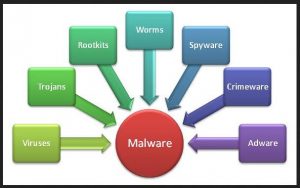Cyber criminals and hackers use Facebook to obtain personal information
 It’s the favourite site used by cyber criminals to obtain personal information, so I use Facebook as little as possible and provide it with as little genuine information about myself as possible. This is also because, like Google, it forms part of the modern Big Brother spy network. Governments, especially the US and UK security services, have access to the information you provide to social media sites or to the information that those sites collect about you from elsewhere. Indeed, many web experts believe that those sites were probably created in the first place to spy on the public. Not may people know that the US security services were spying on the telephone networks long before they were used to provide access to the Internet.
It’s the favourite site used by cyber criminals to obtain personal information, so I use Facebook as little as possible and provide it with as little genuine information about myself as possible. This is also because, like Google, it forms part of the modern Big Brother spy network. Governments, especially the US and UK security services, have access to the information you provide to social media sites or to the information that those sites collect about you from elsewhere. Indeed, many web experts believe that those sites were probably created in the first place to spy on the public. Not may people know that the US security services were spying on the telephone networks long before they were used to provide access to the Internet.
Dump the social media sites and just use email
If you don’t run a business that needs to use social media for promotion, etc., it is advisable not to use the social network sites at all, in my opinion. Just use email. Don’t use Gmail, Microsoft’s outlook.com or any other email account provided by a commercial website. Your Internet Service Provider provides a free email account. Better still, spend a few pounds a year and buy yourself a domain name that provides email addresses. It has to be registered every year at least, unless you pay for several years’ registration in advance.
Buy a personal domain name that provides email addresses
For example, your name is Cecil McDuck. You buy a domain name from a website-hosting company called cecilmcduck.net (.co.uk, .com, etc.) and then just use it to set up an email account called cecil@cecilmcduck.net. You don’t have to do so, but can also use your domain to set up a personal website. A domain name allows many email accounts to be set up, so you can set email addresses for your whole family @cecilmcduck.net. Then you just have to set up a free email client, such as Mozilla Thunderbird, with the email address or addresses.
The following video shows how easy that is to do. You just enter the email address in Thunderbird and it looks up and sets up everything automatically. You just have to enter your password to access your email account. You can also enter Gmail, Microsoft, etc., email accounts to collect your email instead of going online.
How To Use Mozilla Thunderbird –
https://www.youtube.com/watch?v=s1GnTJDux0I

Use a Virtual Private Network (VPN) to encrypt your internet traffic, including email
Using a virtual private network (VPN) service that encrypts digital communications, including email, provides an additional level of security. Hackers will find it next to impossible to intercept your Internet traffic if you use one.
If you use Wi-Fi hotspots and public Wi-Fi networks, it is advisable to subscribe to a VPN service, some of which are free. Web-search for VPN services to find plenty of information about them and the actual services on offer.
Virtual Private Networking (VPN) –
https://www.pcbuyerbeware.co.uk/hardware/wired-and-wireless-networking/16/
Identity theft: Personal information is very useful to cyber criminals and hackers
If you visit the Facebook pages of friends and people you know, you are aware that they foolishly provide private information about themselves that is very useful to cyber criminals and hackers. They use it for identity theft, which can be extremely damaging, or to find out the best times to break into your house if you are foolish enough to post when you are going out or going on vacation.
Facebook changes its terms and conditions and privacy policies constantly
Facebook is constantly evolving into a bigger and better information-harvesting machine. It changes its terms and conditions and privacy policies constantly.
Therefore, it is necessary to keep reviewing which information you are allowing Facebook to collect about you and use to deliver personalised adverts. Your profile information, activities on the site and adverts you have clicked determine which kind of adverts appear when you visit the site.
Facebook can’t get enough of your personal information
All Facebook users know that the site is constantly urging its users to provide it with more personal information by asking for personal-profile updates. A graph tells you as a percentage how much of your required personal information has been supplied. If the percentage is say, 66%, Facebook keeps asking for the remaining 44%. Moreover, as you use the site, Facebook is constantly collecting information about you and your friends and acquaintances, what you like and dislike, where you go and what you do, your political preferences, the websites you visit, hobbies, etc.
Check your privacy settings
Therefore, the first action to take is to check your privacy settings, not just once but every so often, starting at the following page.
Privacy basics – https://www.facebook.com/about/basics/
There are several links on that page that provide information that you should know about, some of it of more importance with regard to your privacy than others.
For example, in January 2017, the “How to keep your account secure” page linked to 11 other informational pages.
It is advisable to go through the Facebook sections – security, privacy and ads – and remove as much of the collected personal information as possible.
Facebook phishing sites
With regard to phishing, for example, Facebook warns that fake websites exist that mimic the Facebook site and its email notifications. If you log into a faked Facebook site, you are providing cyber thieves with your username and password. Then, if you use the same password for other sites, such as PayPal, that uses only a user name password, the cyber criminals will try using your email address and Facebook password to access your PayPal account. Your account will be robbed if it works. Therefore, always use unique, strong passwords that have more than 8 mixed keyboard characters and numbers (make a few of the letters capitals) for websites as sensitive as PayPal, Amazon and other store accounts.
Note that no website that holds your personal information or money will ever email you and ask for you login information in order to restore a broken account, etc.
Phishing – https://www.facebook.com/about/basics/how-to-keep-your-account-secure/phishing/
If you have Facebook ‘friends’ who provide spam, unfriend them immediately. According to Facebook, friends who are removed are not notified.
More PC security information
PC security: How to protect computers from hackers, viruses, trojans, malware, phishing scams, etc. –